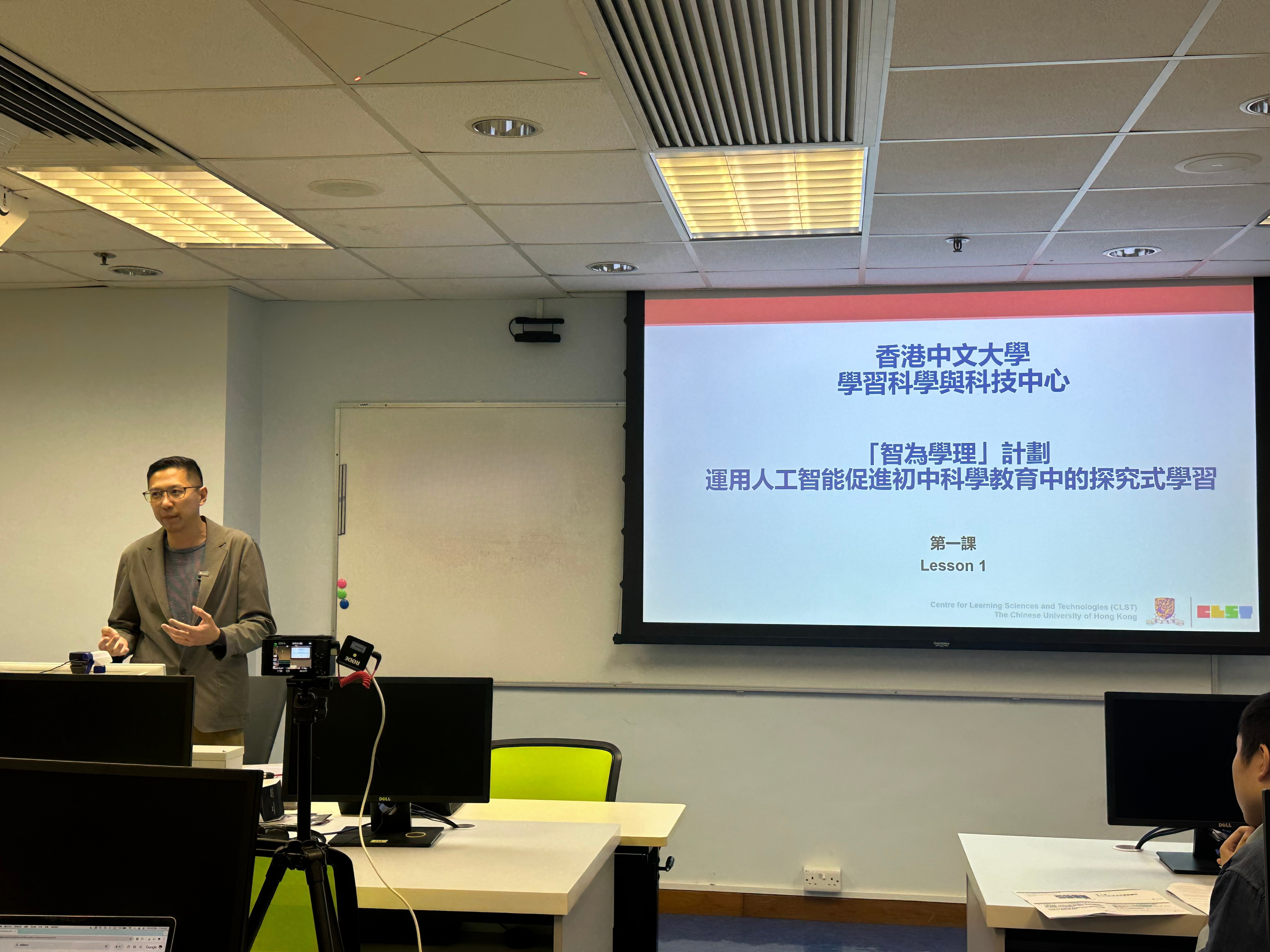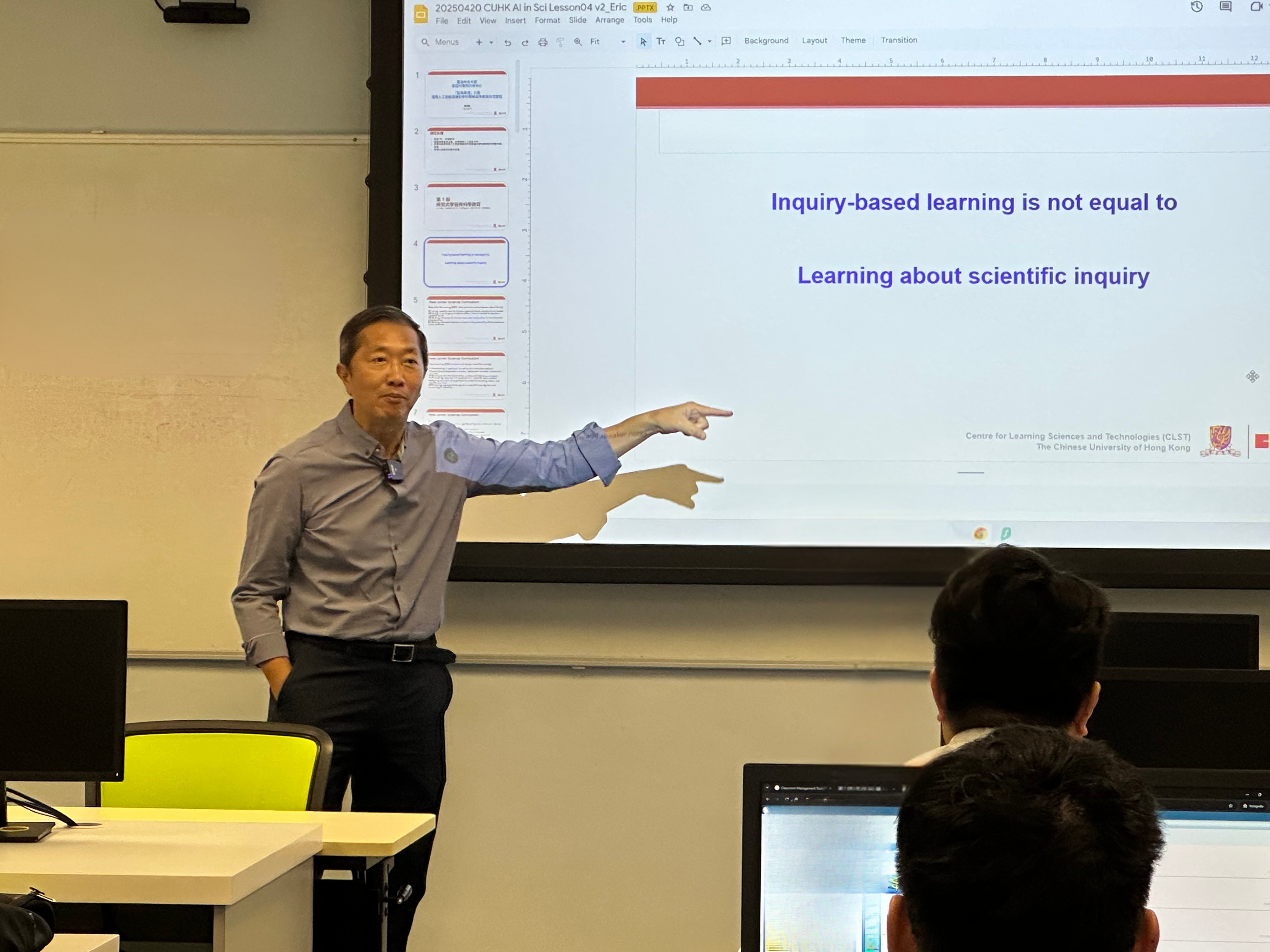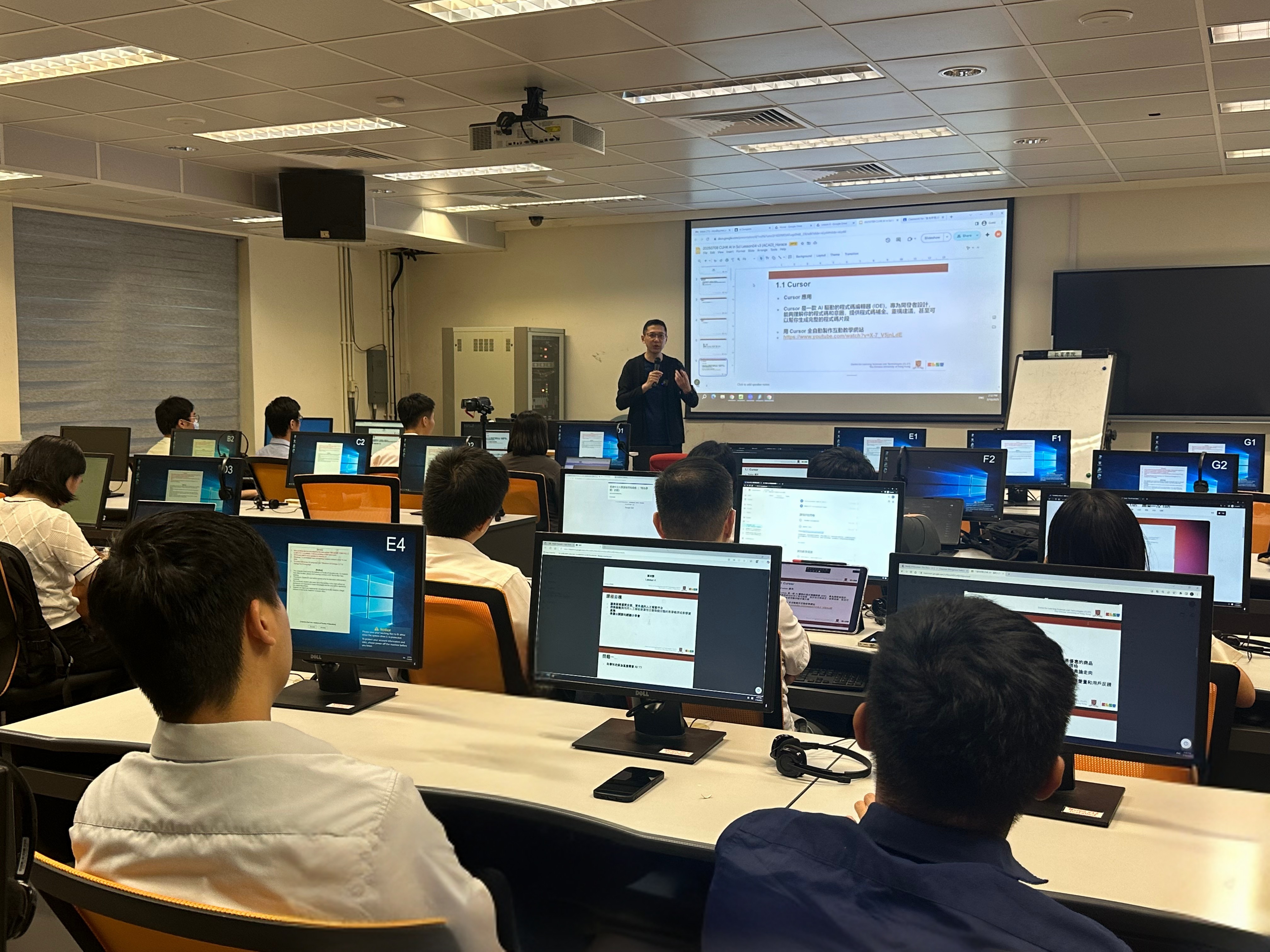“AI for Science Education” Programme (2025–2027)
Harnessing AI to Promote Inquiry-Based Learning in Junior Secondary Science Education
Professional Development Programme for School Teachers, funded by the Education Bureau (EDB)
The course supports primary and secondary school teachers in integrating AI into English language education. Through a blend of live webinars and face-to-face lessons, participants gain both theoretical understanding and practical experience in using AI to enhance teaching and learning across reading, writing, listening, and speaking.
At the Basic Level, teacher participants:
- Explore the fundamentals of AI in education, focusing on natural language processing, machine learning, and speech recognition.
- Understand pedagogical principles of AI-driven instruction, including learner-centered approaches, the role of feedback, and assessment practices.
- Identify the features of widely used AI tools for English language learning, such as Grammarly, Duolingo, ChatGPT, Talkpal, and Quillbot.
- Discuss ethical implications such as data privacy, algorithmic bias, and the student–teacher relationship in AI adoption.
At the Advanced Level, teacher participants:
- Master the use of AI tools for designing and delivering English lessons.
- Apply generative AI to create reading materials, scaffold writing activities, and develop resources for listening and speaking practice.
- Gain hands-on experience with platforms such as POE, Canva, Natural Reader, Suno, Grammarly, and Duolingo AI.
- Design self-directed learning activities, assessments, and feedback mechanisms supported by AI.
- Critically reflect on ethical and social implications, ensuring responsible and balanced AI use in classrooms.
The course combines hands-on practice with reflective discussion, enabling teachers to adopt AI tools with confidence and responsibility. Participants leave equipped to harness AI technologies to enrich English language instruction, promote learner autonomy, and sustain equitable, effective learning. By the end of the courses, more than 1,400 teachers will be served.
Teaching Mathematics with Artificial Intelligence (2025–2027)
Professional Development Programme for School Teachers, funded by the Education Bureau (EDB)
The course helps primary and secondary school teachers harness AI tools to enrich mathematics education. Through live webinars and in-person workshops, participants gain both conceptual understanding and practical skills to apply AI meaningfully in mathematics classrooms.
At the Basic Level, teacher participants:
- Learn what artificial intelligence (AI) and large language models (LLMs) are, and why AI matters in mathematics education.
- Explore how AI can support teaching and learning across the five strands: Number, Algebra, Measures, Shape & Space, and Data Handling.
- Gain exposure to tools such as Photomath, Wolfram Alpha, Eduaide AI, Microsoft Maths Solver, and WebSIM AI.
- Understand the pedagogical benefits and challenges of AI-driven instruction, including modelling phenomena and abstracting concepts beyond specific cases.
- Discuss ethical implications such as data security, bias, and information literacy.
At the Advanced Level, teacher participants:
- Deepen their understanding of LLMs and their role in mathematics learning, problem-solving, and personalized tutoring.
- Develop skills in prompt engineering and even training bots for specific teaching purposes.
- Engage in hands-on practice with advanced AI tools including Microsoft Copilot, MagicSchool, Photomath, Eduaide AI, and Microsoft Maths Solver.
- Design and trial AI-driven activities, assessments, and feedback mechanisms to support student-centered and self-directed learning.
- Collaboratively evaluate AI-supported lesson designs and refine strategies for effective classroom use.
With a strong focus on hands-on practice and reflective pedagogy, this course equips teachers to leverage AI in ways that enhance mathematical understanding, foster inquiry, and personalize learning experiences, while maintaining responsible and ethical use. By the end of the courses, more than 1,400 teachers will be served.
As one of Hong Kong’s pilot initiatives to integrate AI technologies into outdoor learning, this programme is funded by the Quality Education Fund (QEF) under the e-Learning Ancillary Facilities Programme (eLAFP). It aims to transform field trips by combining AI-enhanced features with GPS technology, allowing students to engage in on-site learning activities that integrate data collection with reflective practices. This approach not only strengthens inquiry-based learning and promotes self-directed learning, but also supports teachers in designing instructional materials and conducting effective assessments.
Programme Highlights:
- Utilize the AI tool to generate engaging, level-specific questions that align with curriculum objectives, saving teachers’ valuable preparation time while personalizing the learning experience
- Deliver over 30 custom-designed outdoor learning modules catered to General Studies (Humanities and Science) in primary education, Citizenship and Social Development in secondary education, and other subjects that can benefit from outdoor experiential learning
- Offer AI-powered automatic evaluation, offering consistent initial feedback and freeing up teacher time to focus on more intensive, personalized student support
- Include on-site technical support and teacher professional development, ensuring educators are well-prepared to leverage AI tools during mobile learning tasks
Unique Features:
- Build upon the well-established EduVenture® platform—already used by 500+ schools and around 2,700 teachers—by introducing AI-powered, data-driven enhancements to further improve teaching quality
- Promote inquiry-based, gamified learning: students follow location-based prompts, answer tasks, and submit responses—all via EduVenture® X, even offline
- Elevate teaching with real-time data-driven insights, allowing for timely intervention and personalized support throughout outdoor field learning
[/vc_column_text]
Teaching Chinese with Artificial Intelligence (2025–2027)
Professional Development Programme for School Teachers, funded by the Education Bureau (EDB)
The course equips primary and secondary school teachers with the knowledge, skills, and pedagogical strategies to integrate AI into Chinese language teaching. Through a combination of live webinars and face-to-face lessons, participants explore how emerging AI tools can transform reading, writing, listening, and speaking instruction while ensuring responsible and ethical use.
At the Basic Level, teacher participants:
- Understand the fundamentals of AI in education, with a focus on natural language processing, machine learning, and speech recognition.
- Learn the pedagogical principles of AI-driven language instruction, including learner-centered design, feedback, and assessment.
- Identify useful features of common AI tools for Chinese language learning.
- Examine ethical implications of AI adoption, such as bias, data privacy, and equity.
At the Advanced Level, teacher participants:
- Master specific AI tools for Chinese language instruction and assessment.
- Apply generative AI to scaffold writing, expand vocabulary, and inspire creative expression.
- Explore AI applications for reading comprehension, listening, and speaking practice, including the use of chatbots, visual generation tools, and speech technologies.
- Design and evaluate AI-driven teaching pedagogies that support self-directed learning and diverse learner needs.
Throughout the course, teacher participants engage in hands-on practice with various AI-integrated learning platforms. They also reflect critically on the ethical and social implications of AI in classrooms, developing strategies for responsible implementation that balance technological innovation with teacher expertise. By the end of the courses, more than 1,400 teachers will be served.
Teaching English with Artificial Intelligence (2025–2027)
Professional Development Programme for School Teachers, funded by the Education Bureau (EDB)
The course supports primary and secondary school teachers in integrating AI into English language education. Through a blend of live webinars and face-to-face lessons, participants gain both theoretical understanding and practical experience in using AI to enhance teaching and learning across reading, writing, listening, and speaking.
At the Basic Level, teacher participants:
- Explore the fundamentals of AI in education, focusing on natural language processing, machine learning, and speech recognition.
- Understand pedagogical principles of AI-driven instruction, including learner-centered approaches, the role of feedback, and assessment practices.
- Identify the features of widely used AI tools for English language learning, such as Grammarly, Duolingo, ChatGPT, Talkpal, and Quillbot.
- Discuss ethical implications such as data privacy, algorithmic bias, and the student–teacher relationship in AI adoption.
At the Advanced Level, teacher participants:
- Master the use of AI tools for designing and delivering English lessons.
- Apply generative AI to create reading materials, scaffold writing activities, and develop resources for listening and speaking practice.
- Gain hands-on experience with platforms such as POE, Canva, Natural Reader, Suno, Grammarly, and Duolingo AI.
- Design self-directed learning activities, assessments, and feedback mechanisms supported by AI.
- Critically reflect on ethical and social implications, ensuring responsible and balanced AI use in classrooms.
The course combines hands-on practice with reflective discussion, enabling teachers to adopt AI tools with confidence and responsibility. Participants leave equipped to harness AI technologies to enrich English language instruction, promote learner autonomy, and sustain equitable, effective learning. By the end of the courses, more than 1,400 teachers will be served.
Teaching Mathematics with Artificial Intelligence (2025–2027)
Professional Development Programme for School Teachers, funded by the Education Bureau (EDB)
The course helps primary and secondary school teachers harness AI tools to enrich mathematics education. Through live webinars and in-person workshops, participants gain both conceptual understanding and practical skills to apply AI meaningfully in mathematics classrooms.
At the Basic Level, teacher participants:
- Learn what artificial intelligence (AI) and large language models (LLMs) are, and why AI matters in mathematics education.
- Explore how AI can support teaching and learning across the five strands: Number, Algebra, Measures, Shape & Space, and Data Handling.
- Gain exposure to tools such as Photomath, Wolfram Alpha, Eduaide AI, Microsoft Maths Solver, and WebSIM AI.
- Understand the pedagogical benefits and challenges of AI-driven instruction, including modelling phenomena and abstracting concepts beyond specific cases.
- Discuss ethical implications such as data security, bias, and information literacy.
At the Advanced Level, teacher participants:
- Deepen their understanding of LLMs and their role in mathematics learning, problem-solving, and personalized tutoring.
- Develop skills in prompt engineering and even training bots for specific teaching purposes.
- Engage in hands-on practice with advanced AI tools including Microsoft Copilot, MagicSchool, Photomath, Eduaide AI, and Microsoft Maths Solver.
- Design and trial AI-driven activities, assessments, and feedback mechanisms to support student-centered and self-directed learning.
- Collaboratively evaluate AI-supported lesson designs and refine strategies for effective classroom use.
With a strong focus on hands-on practice and reflective pedagogy, this course equips teachers to leverage AI in ways that enhance mathematical understanding, foster inquiry, and personalize learning experiences, while maintaining responsible and ethical use. By the end of the courses, more than 1,400 teachers will be served.
The “AI for Science Education” Programme, supported by the Quality Education Fund (QEF), empowers science teachers to integrate AI technologies into classroom practice. The programme enhances teachers’ capacity in AI-assisted teaching, promotes pedagogical innovation, and strengthens students’ inquiry and engagement in science learning.
Our programme introduces foundational AI concepts—including generative AI and large language models (LLMs)—and provides hands-on training for teachers to design science lessons that foster critical thinking and exploration. Following the training, we deliver school-based support, guiding teachers to apply AI strategies in real classrooms. This personalized support ensures effective implementation, helps overcome challenges, and sustains innovation in teaching practice.
By combining professional development with on-site support, the programme equips teachers to adopt AI-powered, student-centered approaches to science education.
[/vc_column_text]
AI x EduVenture® Self-directed Learning Resources Programme (2023–2026)
General Studies (Humanities and Science) in Primary Education and Citizenship and Social Development in Secondary Education
As one of Hong Kong’s pilot initiatives to integrate AI technologies into outdoor learning, this programme is funded by the Quality Education Fund (QEF) under the e-Learning Ancillary Facilities Programme (eLAFP). It aims to transform field trips by combining AI-enhanced features with GPS technology, allowing students to engage in on-site learning activities that integrate data collection with reflective practices. This approach not only strengthens inquiry-based learning and promotes self-directed learning, but also supports teachers in designing instructional materials and conducting effective assessments.
Programme Highlights:
- Utilize the AI tool to generate engaging, level-specific questions that align with curriculum objectives, saving teachers’ valuable preparation time while personalizing the learning experience
- Deliver over 30 custom-designed outdoor learning modules catered to General Studies (Humanities and Science) in primary education, Citizenship and Social Development in secondary education, and other subjects that can benefit from outdoor experiential learning
- Offer AI-powered automatic evaluation, offering consistent initial feedback and freeing up teacher time to focus on more intensive, personalized student support
- Include on-site technical support and teacher professional development, ensuring educators are well-prepared to leverage AI tools during mobile learning tasks
Unique Features:
- Build upon the well-established EduVenture® platform—already used by 500+ schools and around 2,700 teachers—by introducing AI-powered, data-driven enhancements to further improve teaching quality
- Promote inquiry-based, gamified learning: students follow location-based prompts, answer tasks, and submit responses—all via EduVenture® X, even offline
- Elevate teaching with real-time data-driven insights, allowing for timely intervention and personalized support throughout outdoor field learning
Teaching Chinese with Artificial Intelligence (2025–2027)
Professional Development Programme for School Teachers, funded by the Education Bureau (EDB)
The course equips primary and secondary school teachers with the knowledge, skills, and pedagogical strategies to integrate AI into Chinese language teaching. Through a combination of live webinars and face-to-face lessons, participants explore how emerging AI tools can transform reading, writing, listening, and speaking instruction while ensuring responsible and ethical use.
At the Basic Level, teacher participants:
- Understand the fundamentals of AI in education, with a focus on natural language processing, machine learning, and speech recognition.
- Learn the pedagogical principles of AI-driven language instruction, including learner-centered design, feedback, and assessment.
- Identify useful features of common AI tools for Chinese language learning.
- Examine ethical implications of AI adoption, such as bias, data privacy, and equity.
At the Advanced Level, teacher participants:
- Master specific AI tools for Chinese language instruction and assessment.
- Apply generative AI to scaffold writing, expand vocabulary, and inspire creative expression.
- Explore AI applications for reading comprehension, listening, and speaking practice, including the use of chatbots, visual generation tools, and speech technologies.
- Design and evaluate AI-driven teaching pedagogies that support self-directed learning and diverse learner needs.
Throughout the course, teacher participants engage in hands-on practice with various AI-integrated learning platforms. They also reflect critically on the ethical and social implications of AI in classrooms, developing strategies for responsible implementation that balance technological innovation with teacher expertise. By the end of the courses, more than 1,400 teachers will be served.
Teaching English with Artificial Intelligence (2025–2027)
Professional Development Programme for School Teachers, funded by the Education Bureau (EDB)
The course supports primary and secondary school teachers in integrating AI into English language education. Through a blend of live webinars and face-to-face lessons, participants gain both theoretical understanding and practical experience in using AI to enhance teaching and learning across reading, writing, listening, and speaking.
At the Basic Level, teacher participants:
- Explore the fundamentals of AI in education, focusing on natural language processing, machine learning, and speech recognition.
- Understand pedagogical principles of AI-driven instruction, including learner-centered approaches, the role of feedback, and assessment practices.
- Identify the features of widely used AI tools for English language learning, such as Grammarly, Duolingo, ChatGPT, Talkpal, and Quillbot.
- Discuss ethical implications such as data privacy, algorithmic bias, and the student–teacher relationship in AI adoption.
At the Advanced Level, teacher participants:
- Master the use of AI tools for designing and delivering English lessons.
- Apply generative AI to create reading materials, scaffold writing activities, and develop resources for listening and speaking practice.
- Gain hands-on experience with platforms such as POE, Canva, Natural Reader, Suno, Grammarly, and Duolingo AI.
- Design self-directed learning activities, assessments, and feedback mechanisms supported by AI.
- Critically reflect on ethical and social implications, ensuring responsible and balanced AI use in classrooms.
The course combines hands-on practice with reflective discussion, enabling teachers to adopt AI tools with confidence and responsibility. Participants leave equipped to harness AI technologies to enrich English language instruction, promote learner autonomy, and sustain equitable, effective learning. By the end of the courses, more than 1,400 teachers will be served.
Teaching Mathematics with Artificial Intelligence (2025–2027)
Professional Development Programme for School Teachers, funded by the Education Bureau (EDB)
The course helps primary and secondary school teachers harness AI tools to enrich mathematics education. Through live webinars and in-person workshops, participants gain both conceptual understanding and practical skills to apply AI meaningfully in mathematics classrooms.
At the Basic Level, teacher participants:
- Learn what artificial intelligence (AI) and large language models (LLMs) are, and why AI matters in mathematics education.
- Explore how AI can support teaching and learning across the five strands: Number, Algebra, Measures, Shape & Space, and Data Handling.
- Gain exposure to tools such as Photomath, Wolfram Alpha, Eduaide AI, Microsoft Maths Solver, and WebSIM AI.
- Understand the pedagogical benefits and challenges of AI-driven instruction, including modelling phenomena and abstracting concepts beyond specific cases.
- Discuss ethical implications such as data security, bias, and information literacy.
At the Advanced Level, teacher participants:
- Deepen their understanding of LLMs and their role in mathematics learning, problem-solving, and personalized tutoring.
- Develop skills in prompt engineering and even training bots for specific teaching purposes.
- Engage in hands-on practice with advanced AI tools including Microsoft Copilot, MagicSchool, Photomath, Eduaide AI, and Microsoft Maths Solver.
- Design and trial AI-driven activities, assessments, and feedback mechanisms to support student-centered and self-directed learning.
- Collaboratively evaluate AI-supported lesson designs and refine strategies for effective classroom use.
With a strong focus on hands-on practice and reflective pedagogy, this course equips teachers to leverage AI in ways that enhance mathematical understanding, foster inquiry, and personalize learning experiences, while maintaining responsible and ethical use. By the end of the courses, more than 1,400 teachers will be served.






